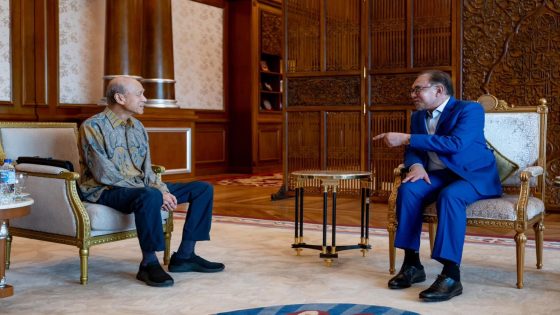The Ontario Legislature has banned the wearing of keffiyehs with its speaker saying the scarves are a “political statement,” while the premier along with opposition leaders are calling for a reversal of the move.
In an email on Wednesday, Speaker Ted Arnott said the legislature has previously restricted the wearing of clothing that is intended to make an “overt political statement” because it upholds a “standard practice of decorum.”
“The Speaker cannot be aware of the meaning of every symbol or pattern but when items are drawn to my attention, there is a responsibility to respond. After extensive research, I concluded that the wearing of keffiyehs at the present time in our Assembly is intended to be a political statement. So, as Speaker, I cannot authorize the wearing of keffiyehs based on our longstanding conventions,” Arnott said in an email.
Arnott’s email did not provide specifics on who drew keffiyehs to his attention or when.
Ontario Premier Doug Ford said in a statement on Tuesday night that he doesn’t support the ban and the decision was made by the speaker and nobody else.
“I do not support his decision as it needlessly divides the people of our province. I call on the speaker to reverse his decision immediately,” Ford said in the statement.
Keffiyehs are a commonly worn scarf among Arabs, but hold special significance to Palestinian people. They have been a frequent sight among pro-Palestinian protesters calling for an end to the violence in Gaza as the Israel-Hamas war continues.
NDP, Liberal leaders also call for reversal
Ontario Liberal Leader Bonnie Crombie also called for a reversal of the ban on Wednesday night.
“Here in Ontario, we are home to a diverse group of people from so many backgrounds. This is a time when leaders should be looking for ways to bring people together, not to further divide us. I urge Speaker Arnott to immediately reconsider this move to ban the keffiyeh,” Crombie said.
Ontario NDP Leader Marit Stiles urged Arnott to reconsider the ban in an April 12 letter to the speaker, saying she considers it unacceptable.
“The Assembly has always permitted Members, staff and guests to openly celebrate their culture, including wearing traditional clothing that represents their history, culture or faith, and I don’t believe it is your intention to change that precedent,” Stiles said.
Keffiyehs are a common garment across the Arab world, but they hold a special meaning in the Palestinian resistance movement.
Stiles said MPPs have worn kilts, kirpans, vyshyvankas and chubas in the legislature, saying such items of clothing not only have national and cultural associations, but have also been considered at times as “political symbols in need of suppression.”
She said Indigenous and non-Indigenous members have also dressed in traditional regalia and these items cannot be separated from their historical and political significance.
“The wearing of these important cultural and national clothing items in our Assembly is something we should be proud of. It is part of the story of who we are as a province,” she said.
“Palestinians are part of that story, and the keffiyeh is a traditional clothing item that is significant not only to them but to many members of Arab and Muslim communities. That includes members of my staff who have been asked to remove their keffiyehs in order to come to work. This is unacceptable.”
Stiles added that House of Commons and other provincial legislatures allow the wearing of keffiyehs in their chambers and the ban makes Ontario an “outlier.”
Suppression of cultural symbols part of genocide: MPP
Sarah Jama, Independent MPP for Hamilton Centre, said on X that the ban is “unsurprising” but “nonetheless concerning” in a country that has a legacy of colonialism. “Part of committing genocide is the forceful suppression of cultural identity and cultural symbols,” she said in part.

Jama added that “state powers” have suppressed Indigenous cultural dress, language, ceremony and beliefs “as tools of genocide” at various points in Canada’s history.
“Seeing those in power in this country at all levels of government, from federal all the way down to school boards, aid Israel’s colonial regime with these tactics in the oppression of Palestinian people proves that reconciliation is nothing but a word when spoken by state powers,” she said.
Amira Elghawaby, Canada’s Special Representative on Combatting Islamophobia, said on X that it is “deeply ironic” on that keffiyehs were banned in the Ontario legislature on the 42nd anniversary of Canada’s Charter of Rights and Freedoms.
“This is wrong and dangerous as we have already seen violence and exclusion impact Canadians, including Muslims of Palestinian descent, who choose to wear this traditional Palestinian clothing,” Elghawaby said.

Arnott said the keffiyeh was not considered a “form of protest” in the legislature prior to statements and debates that happened in the House last fall.
“These items are not absolutes and are not judged in a vacuum,” he said.
Arnott added that he reminded the legislature in a statement on Feb. 22 of its standard practice of decorum, saying: “It has long been the established practice of this House that members should not use props, signage or accessories that are intended to express a political message or are likely to cause disorder. This also extends to members’ attire, where logos, symbols, slogans and other political messaging are not permitted.
“This Legislature is a forum for debate, and the expectation in the chamber is that political statements should be made during debate rather than through the use of props or symbols,” he said.
Source Agencies



